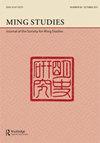The Emperors' New Gifts: Bestowing Sacrificial Necessities and Burial Essentials in Ming Dynasty (1368–1644) China
IF 0.3
0 ASIAN STUDIES
引用次数: 0
Abstract
The tradition of granting funerary gifts from the emperor to his prominent ministers can be traced back to the Zhou dynasty. Scholars have agreed that the gifts meant more than assistance in preparing death rituals but were regarded as an honor to the deceased. What has been less discussed in recent scholarship is the role the emperor perceived himself as playing in the death rituals of his ministers through the types of funerary gifts he offered. A dramatic change in the types of funerary gifts bestowed was initiated by the Hongwu Emperor (1368–1398), and this new practice was continued by the subsequent emperors. By looking into the purpose of granting the new gifts and the ways of bestowing them, both of which had changed over the course of the Ming dynasty, we will be able to scrutinize the dynamic relationships between monarchs and officials through the conflicts between emotions and rituals and the adaptability of Confucian prescriptions and practices.明代皇帝的新礼:赏赐祭祀用品与随葬品
皇帝向其显赫的大臣赠送随葬品的传统可以追溯到周朝。学者们一致认为,这些礼物不仅仅意味着帮助准备死亡仪式,而是被视为对死者的荣誉。在最近的学术研究中,较少讨论的是皇帝通过提供的随葬礼物类型,认为自己在大臣的死亡仪式中扮演的角色。洪武皇帝(1368-1398)开创了随葬品类型的戏剧性变化,这一新做法在随后的皇帝中得到了延续。通过考察新礼物的授予目的和授予方式,我们将能够通过情感和仪式之间的冲突以及儒家处方和实践的适应性来审视君臣之间的动态关系。
本文章由计算机程序翻译,如有差异,请以英文原文为准。
求助全文
约1分钟内获得全文
求助全文

 求助内容:
求助内容: 应助结果提醒方式:
应助结果提醒方式:


